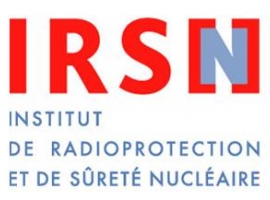
Partner 4: Institute for Radiological Protection and Nuclear Safety ( IRSN), France
Institute for Radiological Protection and Nuclear Safety (IRSN) is a public establishment on an industrial and commercial nature under the joint auspices of the Ministers of the Environment, Health, Research, Industry and Defence. IRSN carries out research, analysis and work within the fields of nuclear safety, protection against ionising radiation, and the control and protection of nuclear and sensitive materials. The institute plays an active role in providing information to the public in its field of expertise but does not exert authority control. IRSN participated in the 5th framework FASSET project, leaded the work package devoted to risk characterisation in the 6th framework ERICA project and was involved in the PROTECT CA as a partner. IRSN has a strong experience in ecological and human risk assessment methodologies. Moreover, IRSN was coordinator of the 6th framework FUTURAE CA. The objective of FUTURAE was to evaluate the potential for establishing deeper and sustainable collaboration of European radioecology, possibly in the form of a network of Excellence. IRSN is also heavily involved in the 7th framework DoReMi project on low-doses. IRSN is the coordinator of the 7th framework STAR (Strategy for Allied Radioecology) NoE. The objective of STAR is to efficiently integrate important organisations, infrastructures, and research efforts into a sustainable network that contributes to a European Research Area in radioecology. IRSN is a founding member of the ALLIANCE.
Staff members contributing to COMET
Dr. Christelle Adam-Guillermin has a 15-year experience in the study of radionuclide fate in aquatic ecosystems, using different biological models from algae to bivalves and fish. She is the Head of Laboratory on radionuclides ecotoxicology, aiming at characterizing radionuclide effects on non-human biota, from molecular to ecosystems. She published ca. 40 peer-reviewed papers. She will lead WP4.
Dr. Karine Beaugelin-Seiller is an 20-year experienced expert in environmental risk assessment, especially regarding wildlife exposure to radionuclides (50+ peer-reviewed papers). She is involved in the conception and development of methods and tools in the field of radioprotection of the environment. She will be involved in WP5.
Dr. Philippe Calmon is a veterinary and has been working for IRSN for more than 15 years. He is an expert in the modeling of radionuclides transfer in the environment with a special emphasis on transfer in forests. He acted as IAEA coordinator for the updating of TRS-472. He will be involved in WP3.
Dr. Celine Duffa joined IRSN about 10 years ago after a PhD dedicated to the study of the behaviour of plutonium in the environment. She is a specialist in the modeling of transfer in marine compartment and she is currently in charge of the development of a tool dedicated to assess the consequences of radioactive releases in sea during a nuclear accident. She will be involved in WP3.
Dr. Laureline Février has 10 years of experience in metals and radionuclides biogeochemistry, with a focus on bioavailability. Other interest concerns the impact of soil microorganisms on radionuclides distribution in terrestrial ecosystems and their temporal evolution, and the impact of radionuclides on the diversity and structure of soil bacterial communities. L. Février contributes to the STAR EC project as researcher and as coordinator assistant for the whole project. She will be involved in WP1 and WP5.
Dr Jean-Christophe Gariel, has worked at IRSN for more than 20 years, and is at present Director in charge of Environment in the Radiation Protection Division at IRSN since 2012. He supervises three departments dealing with: research and expertise on environmental risks, field radioecological studies and environmental radioactivity monitoring, environmental samples processing and radioactive metrology. He acted as the FUTURAE coordinator. He is the ALLIANCE treasurer. He will be involved in WP2.
Dr. Jacqueline Garnier-Laplace has been working for IRSN for 20 years. She is Head of Department on Research and Expertise on Environmental Risks and was involved in the EC funded projects FASSET, ERICA, PROTECT, FUTURAE, STAR. With 80+ peer-reviewed papers, her field of expertise deals with low dose effects in wildlife and ecological risk assessment for radioactive substances. She will be involved in WP2 and WP4.
Dr. Marie Simon-Cornu has about ten years of experience in risk assessment, more specifically in human exposure modeling through food ingestion. She has co-authored 40+ peer-reviewed papers. She joined IRSN in 2010 and is currently Head of the Laboratory of Modeling for Environmental Expertise. She will be involved in WP3.
